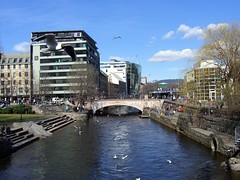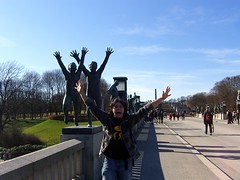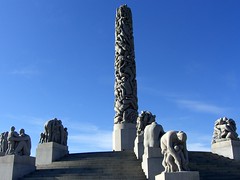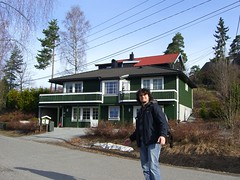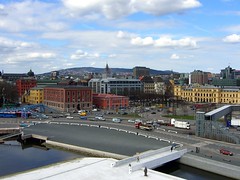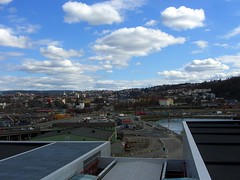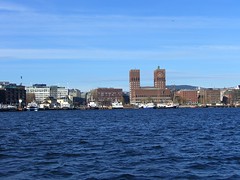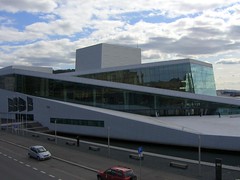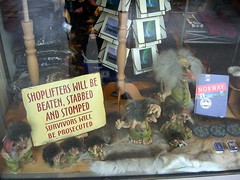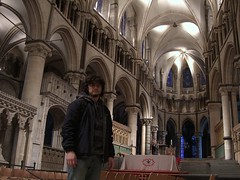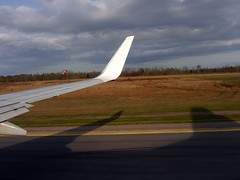
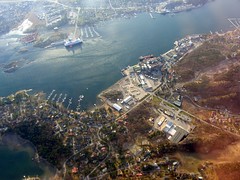
Maybe I'm weird, or maybe I'm still a child inside. I can't help it. I keep marvelling and wondering. I think of all the manpower, the knowledge and ability and effort and resources necessary to keep this steel bird flying. I think of all the engineers and technicians and their teachers and of the pilots and their instructors. I think of the fuel and the oil, of the middle eastern country it most likely comes from and of the rigs and tankers and pipelines and the occupying armies.
But I think back before the aircraft was even built, of the miners and machines that extracted the aluminium and iron and copper and titanium. I think of the traders and stock brokers who bought it and sold it and made it move around the world. I think of the rubber from Brazil and oil from Malaysia and cotton from the US that became the tyres and window frames and seat covers. I think of the kilometres of wiring snaking through its skin and I think of the thousands of kilometres those materials travelled, to be processed and then travel again to be reprocessed somewhere else. I think of the foundries and factories and warehouses, of all the farmers and truck drivers and grunts and foremen and factory workers.
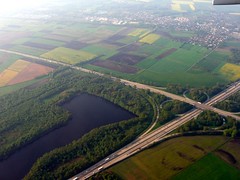
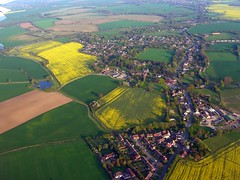
But I think back before it was even in production, of the research and design teams that worked on each individual component. I think of the hundreds of companies involved, big and small, of their executives and secretaries and administrators and investors and receptionists and cleaners. I think of the market analysts and product design specialists who decided what the characteristics of that model of aircraft should be. I think of the state of technology at the time, what improvements were available that could make the final aircraft faster and cheaper to build, more secure and lighter, easier to fly and repair.
And I think of the cycle of industrial production, and I think of that cycle several thousands of iterations back, through the days of propellers and then through many, many wars, hot and cold, worldly and otherwise, and how without them technology would have never advanced at the pace it did. I think of politicians and businessmen and investment bankers and military strategists and international organizations and territory and resources. I think of how the use of planes for reconnaissance missions and for bombing troops and cities and shooting down other pilots put the focus on improving aircraft technology. I think of radar and radio and jet engines and pressurized compartments and computers and composite materials and navigation systems.
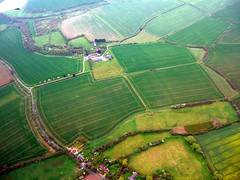
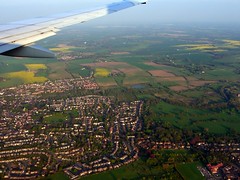
I think of all the pilots who were shot down and all the men and women and children who died in bombing raids. I think of all that had to be bombed, razed, burnt, of all the death and destruction. I also think of all the talent and genius and creativity and energy and chest-filling euphoria of those who made it all possible, one little step at a time, a small improvement here, suddenly a whole new idea there. And I think of the sweat and effort of those who worked hard to make it a reality, and of those who are still doing so right now.


And then I zap back to the now, and I see how it is all interconnected, and how every piece of the puzzle was necessary to get me where I am now, in this situation. Every invention, every breakthrough, every invasion, every takeover, every merger, every bead of sweat and droplet of blood and drop of oil were essential in allowing me to fly now in comfort and safety over thousands of kilometres. The whole world has come together with one aim: to give me the power to fly for the Ryanair price of £0.01, one penny sterling.
My eyes are sparkling. I can't help it.
